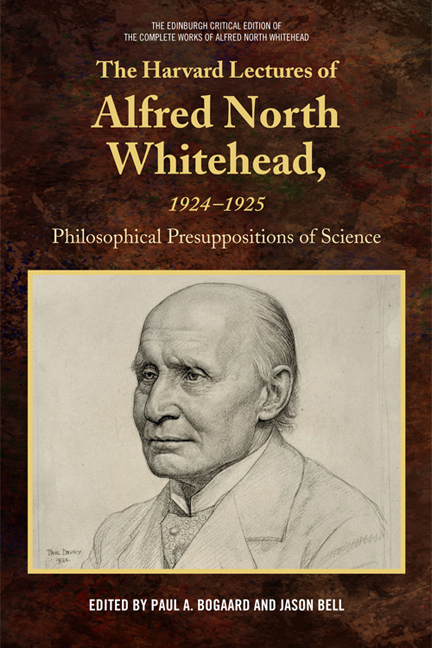Book contents
- Frontmatter
- Contents
- General introduction
- Editorial principles
- Acknowledgements
- Chronology for Alfred North Whitehead
- Published works of Alfred North Whitehead
- Introduction to The Harvard Lectures of Alfred North Whitehead, 1924–1925
- Emerson Hall lectures, Harvard Yard, 1924–1925: Notes taken by W. P. Bell and W. E. Hocking on Phil 3b, ‘Philosophical Presuppositions of Science’, delivered by Alfred North Whitehead
- First semester
- Second semester
- Radcliffe College lectures, 1924–1925: Notes taken by Louise R. Heath on Phil 3b, ‘Philosophical Presuppositions of Science’, delivered by Alfred North Whitehead
- Whitehead Seminary, 1924–1925: Notes taken by W. E. Hocking on Phil 20h, ‘Seminary in Metaphysics’, delivered by Alfred North Whitehead
- Appendix. Scans of original handwritten notes
- Index
First semester
from Emerson Hall lectures, Harvard Yard, 1924–1925: Notes taken by W. P. Bell and W. E. Hocking on Phil 3b, ‘Philosophical Presuppositions of Science’, delivered by Alfred North Whitehead
Published online by Cambridge University Press: 07 December 2017
- Frontmatter
- Contents
- General introduction
- Editorial principles
- Acknowledgements
- Chronology for Alfred North Whitehead
- Published works of Alfred North Whitehead
- Introduction to The Harvard Lectures of Alfred North Whitehead, 1924–1925
- Emerson Hall lectures, Harvard Yard, 1924–1925: Notes taken by W. P. Bell and W. E. Hocking on Phil 3b, ‘Philosophical Presuppositions of Science’, delivered by Alfred North Whitehead
- First semester
- Second semester
- Radcliffe College lectures, 1924–1925: Notes taken by Louise R. Heath on Phil 3b, ‘Philosophical Presuppositions of Science’, delivered by Alfred North Whitehead
- Whitehead Seminary, 1924–1925: Notes taken by W. E. Hocking on Phil 20h, ‘Seminary in Metaphysics’, delivered by Alfred North Whitehead
- Appendix. Scans of original handwritten notes
- Index
Summary
Bell's notes
Every Philosophy dominated by some type of difficulty. – Some problem of fundamental kind lying at root of it.
What are peculiar difficulties of daily life which “this” Philosophy is calculated to solve? is the question
So (1) Sort of difficulty which systematized “Science” presents.
Then 2nd lecture:– question of unifying to coherent whole the presuppositions of Science.
(1) Elucidation of:– What Science is in itself. Might take our start from question of Motives (in human nature) from which Science arises. But not human psychology as starting point here. Rather:– What is there in the Nature of Things which leads that there is or can be any “Science” to be what in outline it is? Certain relations between Theology, Metaphysics, and Science. Theology warned off scientific field in ca 1600, Metaphysics about 1700.
There must be complete freedom for scientific hypotheses.– This is 1st presupposition (and extends to influence from one Science to another). The complexity of things is beyond our power to cope with. New ideas always look ragged and crude and somewhat silly.
But must come back to fundamental fact that it's a rational synthesis we're seeking. The Antinomies are only means to this end. There are no completely autonomous entities in World. Philosophy and even Theology are capable of rendering services to Science. Perhaps even Medieval Theology rendered service in fostering Scientific Spirit. The modern corps of devoted Scientists.
How does Romance pass into exact Investigation and thus eventuate in Science? Belief back of it that there is a simpler order back of the appearances with the very rough regularities there. The Easterner, when he wonders, retires to a cave and continues to wonder. In two centuries 1500–1700 in Europe more done for Science than in the 1500 years of peace and prosperity following death of Aristotle.
Why didn't observant and careful Chinese do it in their Millenniums. Why should there be the search for corresponding Spectrum of Elements?
- Type
- Chapter
- Information
- The Harvard Lectures of Alfred North Whitehead, 1924-1925Philosophical Presuppositions of Science, pp. 3 - 194Publisher: Edinburgh University PressPrint publication year: 2017



